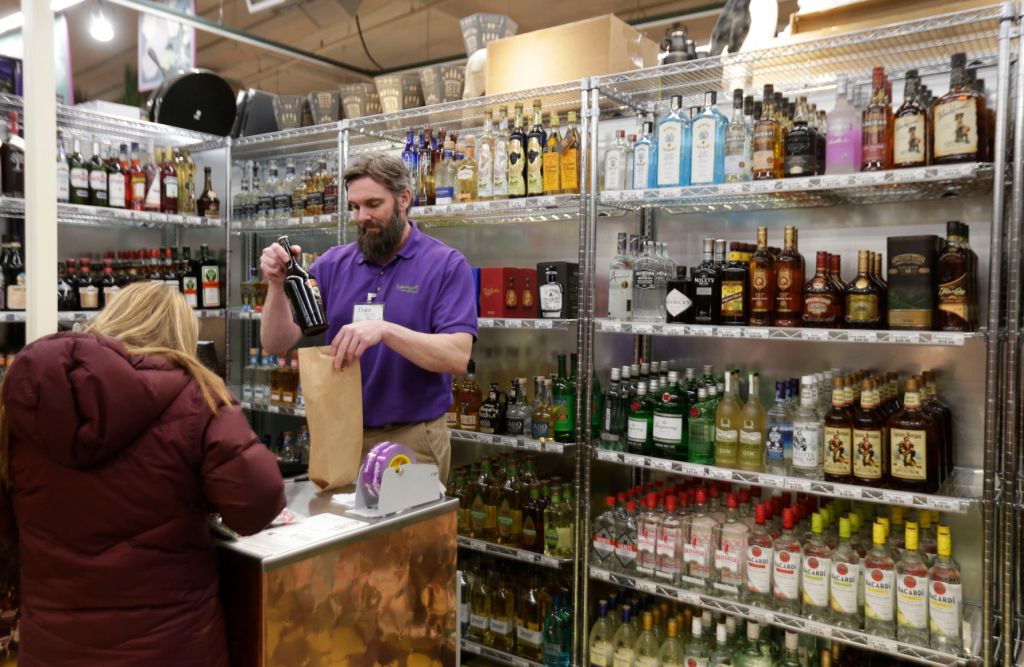OLCC pulls Russian liquor as Oregon soldiers serve near war zone
Published 11:59 am Thursday, March 3, 2022

- Duke Snyder rings up a customer in the new liquor section inside Newport Avenue Market on Wednesday in Bend. (Joe Kline/Bulletin photo)
The Oregon Liquor & Cannabis Commission directed liquor stores on Monday, Feb. 28, to stop selling Russian-made spirits, requiring them to remove 24 vodka products from shelves.
The order was part of economic sanctions against Russian-operated companies designed to bring an end to the war, agency officials said in a statement.
“This is an opportunity for Oregonians to think locally, support democracy, support freedom around the world and reject aggression like this,” said Bryant Haley, spokesperson for the OLCC.
The agency owns all liquor sold in Oregon and licenses businesses to sell it.
About 5,000 bottles of Russian-made liquor were available in 281 liquor stores across the state at the time of the order, according to the OLCC. That amounts to a sale value of about $61,000, Haley said.
Annual sales of Russian-made liquor in Oregon are about $670,000, he said.
Officials also said the agency would stop fulling orders for Russian-made liquor and sequester the remaining supply — more than 6,200 bottles — in its Portland distribution center warehouse.
The agency has the option to return the sequestered bottles, Haley said, adding that officials would evaluate what to do with that supply and bottles pulled from store shelves in the coming days.
At least 10 other states around the country have similarly banned the sale of Russian-made liquor since Russia’s military campaign in Ukraine began on Feb. 24.
The financial impact on Oregon businesses will likely be negligible, as Russian-made vodkas are not among the most popular brands in Oregon, and store owners say they plan to replace bottles removed from shelves with other products, Haley said.
Zeke Macmichael, manager of Hillsdale Liquor, said the ban wouldn’t hurt the Southwest Portland liquor store’s bottom line. Hillsdale Liquor only carried a few Russian vodkas prior to the ban this week, Macmichael said, adding that he took four cases worth of bottles off the shelves.
A lot of people mistakenly think vodkas made in other eastern European countries are from Russia, he said.
“Truth be told, Tito’s is the No. 1 vodka in the state, and that’s made in Texas,” Macmichael said.
Stolichnaya, an iconic Cold War-era vodka once distributed in the United States by Pepsi Co., became the cause of a dispute between rival distilleries that privatized after the fall of the Soviet Union. Stolichnaya sold in Oregon is made in Latvia, a NATO ally.
Smirnoff vodka is made in the United States. Other popular vodkas are made in Sweden and Poland.
Macmichael said he supports the OLCC’s decision to boycott Russian-made products.
“I think it’s a good decision,” he said. “It speaks well for the state to actually flex its muscles in some way. I don’t know how effective it’s going to be, but I think it’s proper in a show of support with the federal sanctions that are being put on Russia.”
In the OLCC’s announcement of the order, Gov. Kate Brown drew a distinction between Russia’s government and its people.
“The actions of the Russian Government are not the actions of the Russian people,” Brown said in a statement. “We value our Russian community here in Oregon, and many Russian families are being impacted by this conflict.”
Government officials in Oregon have been looking for ways to protest the Russian invasion for days.
On Monday, Multnomah County Chair Deborah Kafoury announced lighting on the Morrison Bridge in Portland would display the blue and yellow colors of the Ukrainian flag.
Tobias Read, Oregon’s treasurer and candidate for governor, directed the Oregon State Treasury to evaluate its investment holdings connected to Russia, with the possibility of withdrawing them.
Brown said last week that her office had been in touch with the U.S. State Department to see if there were any Oregonians in the Ukraine seeking assistance.
Oregon Army National Guard soldiers assigned to Charlie Troop, 1st Squadron, 82nd Cavalry Regiment were deployed to Poland on Jan. 2 to support the European Deterrence Initiative as part of Operation Atlantic Resolve. The effort is meant to deter aggression against NATO-member states such as Poland and Latvia.
Poland shares a border with Ukraine and has seen a massive influx of refugees from the fighting. Poland also shares a border with the Russian enclave of Kaliningrad on the Baltic Sea, and Belarus, Russia’s strongest ally in eastern Europe.
Oregon Capital Bureau reporter Gary Warner contributed to this report





